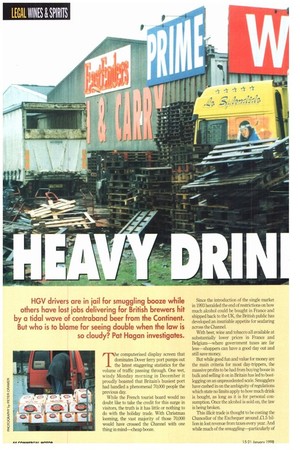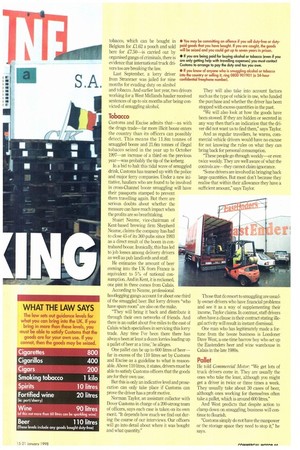LEGAL MIES & SPIRITS
Page 56

Page 57

If you've noticed an error in this article please click here to report it so we can fix it.
HGV drivers are in jail for smuggling booze while others have lost jobs delivering for British brewers hit by a tidal wave of contraband beer from the Continent. But who is to blame for seeing double when the law is so cloudy? Pat Hagan investigates.
The computerised display screen that dominates Dover ferry port pumps out the latest staggering statistics for the volume of traffic passing through. One wet, windy Monday morning in December it proudly boasted that Britain's busiest port had handled a phenomenal 70,000 people the previous day.
While the French tourist board would no doubt like to take the credit for this surge in visitors, the truth is it has little or nothing to do with the holiday trade. With Christmas looming, the vast majority of those 70,000 would have crossed the Channel with one thing in mind—cheap booze. Since the introduction of the single market in 1993 heralded the end of restrictions on how much alcohol could be bought in France and shipped back to the UK, the British public has developed an insatiable appetite for seafaring across the Channel.
With beer, wine and tobacco all available at substantially lower prices in France and Belgium—where government taxes are far less—shoppers can have a good day out and still save money.
But while good fun and value for money are the main criteria for most day-trippers, the massive profits to be had from buying booze in bulk and selling it on in Britain has led to bootlegging on an unprecedented scale. Smugglers have cashed in on the ambiguity of regulations which state no limits apply to how much drink is bought, as long as it is for personal consumption. Once the alcohol is sold on, the law is being broken.
This illicit trade is thought to be costing the Chancellor of the Exchequer around £1.5 billion in lost revenue from taxes every year. And while much of the smuggling—particularly of tobacco, which can be bought in Belgium for £1.62 a pouch and sold here for £7.50—is carried out by organised gangs of criminals, there is evidence that international truck drivers too are breaking the law.
Last September, a lorry driver from Stranraer was jailed for nine months for evading duty on alcohol and tobacco. And earlier last year, two drivers working for a West Midlands haulier received sentences of up to six months after being convicted of smuggling alcohol.
Tobacco
Customs and Excise admits that—as with the drugs trade—far more illicit booze enters the country than its officers can possibly detect. This means the 11.8m tonnes of smuggled booze and 21.6m tonnes of illegal tobacco seized in the year up to October 1997—an increase of a third on the previous year—was probably the tip of the iceberg.
In a bid to halt this tidal wave of smuggled drink, Customs has teamed up with the police and major ferry companies. Under a new initiative, hauliers who are found to be involved in cross-Channel booze smuggling will have their passports stamped to prevent them travelling again. But there are serious doubts about whether the measure can have much impact when the profits are so breathtaking Stuart Neame, vice-chairman of Kent-based brewing firm Shepherd Neame, claims the company has had to close 45 of its 360 pubs since 1993 as a direct result of the boom in contraband booze. Ironically, this has led to job losses among delivery drivers as well as pub landlords and staff.
He estimates the amount of beer coming into the UK from France is equivalent to 5% of national consumption. And in Kent, it is reckoned, one pint in three comes from Calais.
According to Neame, professional bootlegging gangs account for about one third of the smuggled beer. But lorry drivers "who have spare room" are also on the make.
'They will bring it back and distribute it through their own networks of friends. And there is an outlet about five miles to the east of Calais which specialises in servicing this lorry trade. Any time I've been there there has always been at least a dozen lorries loading up a pallet of beer at a time,' he alleges.
One pallet can be up to 600 litres of beer— far in excess of the 110 litres set by Customs and Excise as a guideline to what is reasonable. Above 110 litres, it states, drivers must be able to satisfy Customs officers that the goods are for their own use.
But this is only an indicative level and prosecution can only take place if Customs can prove the driver has a profit motive.
Norman Taylor, an assistant collector with Dover Customs in charge of a 200-strong team of officers, says each case is taken on its own merit. "It depends how much we find out during the course of our interviews, Our officers will go into detail about where it was bought and what quantity." They will also take into account factors such as the type of vehicle in use, who funded the purchase and whether the driver has been stopped with excess quantities in the past.
"We will also look at how the goods have been stowed. If they are hidden or secreted in any way then that's an indication that the driver did not want us to find them," says Taylor.
And as regular travellers, he warns, commercial vehicle drivers would have no excuse for not knowing the rules on what they can bring back for personal consumption.
"These people go through weekly—or even twice weekly. They are well aware of what the controls are—they cannot claim ignorance.
"Some drivers are involved in bringing back large quantities. But most don't because they realise that within their allowance they have a sufficient amount," says Taylor.
Those that do resort to smuggling are usually owner-drivers who have financial problems and see it as a way of supplementing their income, Taylor claims. In contrast, staff drivers often have a clause in their contract stating illegal activity will result in instant dismissal.
One man who has legitimately made a fortune from the booze business is Londoner Dave West, a one-time barrow boy who set up the Eastenders beer and wine warehouse in Calais in the late 1980s.
Pallet
He told Commercial Motor: "We get lots of truck drivers come in. They are usually the ones who take the least, although you might get a driver in twice or three times a week. They usually take about 30 cases of beer, although ones working for themselves often take a pallet, which is around 600 litres,"
And West predicts that despite action to clamp down on smuggling, business will continue to flourish.
"Customs simply do not have the manpower or the storage space they need to stop it," he says,
• You may be committing on offence if you sell duty-free or dutypaid goods that you have bought. If you are caught, the goods will be seized and you could get up to seven years in prison.
• If you are being paid for buying alcohol or tobacco (even if you are only getting help with travelling expenses) you must contact Customs to arrange to pay the duty and tax you owe.
• If you know of anyone who is smuggling alcohol or tobacco into the couniry or selling it, ring 0800 901901 (a 24-hour confidential heephone number).
WHAT THE LAW SAYS
The law sets out guidance levels for what you can bring into the UK. If you bring in more than these levels, you must be able to satisfy Customs that the goods are for your own use. If you cannot, then the goods may be seized.
Cigarettes 800 Cigarillos 400 Cigars 200
Smoking tobacco 1 kilo
Spirits 10 litres Fortified wine 20 litres
lie: port/sherry)
Wine 90 litres
(of this not more than 60 litres can be sparkling wine)
Beer 1 1 0 litres
(these levels include any goods bought duty-free)
















































































































